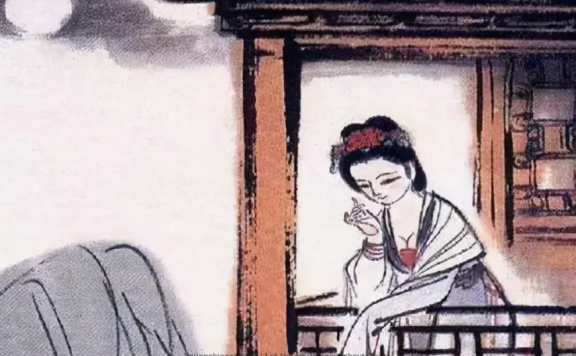-
Liu Kezhuang: Man Jianghong —The cold night rain kindles my passion for enlisting in the army. ~ 《满江红·夜雨凉甚 忽动从戎之兴》 刘克庄 with English Translations
"Man Jiang Hong: The Night Rain is Very Cool and Suddenly I Want to Join the Army" is one of the representative works of Liu Kezhuang, a patriotic poet in the late Southern Song Dynasty. The first part describes the past, with a positive style and a heroic and vigorous style; the second part describes the present, with a purely negative style and a suppressed and gloomy style. The use of contrast is very contagious. The author of this poem said in his own note that "suddenly I want to join the army", which means that the author suddenly had the idea of joining the army to fight against the Jin Dynasty. The situation is like this: Liu Kezhuang was once dismissed because of the "Jianghu Poetry Case". In the sixth year of Shaoding (1233 AD), when the Mongols destroyed the Jin Dynasty, the Song army went north to seek recovery and return to Henan, and Liu Kezhuang was still idle at home. The war between the Song and Jin Dynasties aroused the poet's idea of joining the army to fight against the Jin Dynasty. This is the background for the author to write this poem. 《满江红·夜雨凉甚忽动从戎之兴》是南宋后期爱国词人刘克庄的代表作之一。上片写过去,正面着笔,风格豪迈雄健;下片写今日,纯用反笔,风格掩抑沉郁。运用对比手法,极富感染力。这首词作者在自注中说“忽动从戎之兴”,即作者忽然产生从军抗金的念头。情况是这样:刘克庄曾因“江湖诗案”遭难被黜。到绍定六年(公元1233)蒙古灭金之际,宋师北上谋复回河南,刘克庄尚闲置在家。宋金之间的这场战争引起了诗人从军抗金的念头。这是作者写作此词的背景。 《满江红·夜雨凉甚 忽动从戎之兴》 刘克庄… -
Liu Kezhuang Poem: Congratulations to the Bridegroom · A Songstress Singing at the Banquet– 刘克庄《贺新郎·席上闻歌有感》
"Congratulations to the Bridegroom · A Songstress Singing at the Banquet" is a lyric composed by Liu Kezhuang, a lyricist of the Southern Song Dynasty.- 20
- 0
-
Liu Kezhuang Poem: A Sprig of Mume Blossoms · Farewell at Phoenix Pavilion– 刘克庄《一剪梅·余赴广东实之夜饯于风亭》
"A Sprig of Mume Blossoms · Farewell at Phoenix Pavilion" is a lyric by Liu Kezhuang of the Song Dynasty.- 16
- 0
-
Liu Kezhuang Poem: Congratulations to the Bridegroom Reply to Wang Shizhi on his worries of the frontiers – 刘克庄《贺新郎 实之三和有忧边语,走笔答之》
贺新郎实之三和有忧边语,走笔答之 刘克庄 国脉微如缕。问长缨[1]何时入手,缚将戎主?未必人间无好汉,谁与宽些尺度?试看取当年韩五[2]。岂有谷城公[3]付授,也不干曾遇骊山母[4]。谈笑起,两河路。少时棋柝[5]曾联句。叹而今登楼揽镜[6],事机频误。闻说北风吹面急,边上冲梯[7]屡舞。君莫道投鞭虚语。自古一贤能制难[8],有金汤[9]、便可无张许[10]?快投笔,莫题柱。 注释:[1]长缨:捕缚放人的长绳。这里指统帅部队的军权。[2]韩五:指抗金名将韩世忠。他排行第五,嗜酒豪纵,人称他“泼韩五”。[3]谷城公:也称黄石公。曾经传授西汉张良《太公兵法》,并说:“十三年孺子见我济北,谷城山下黄石即我。”(见《史记·留侯世家》)[4]骊山母:骊山老母,为道教女神仙。《集仙传》载,唐代将军李筌在嵩山得到黄帝《阴符经》,不晓其义,后在骊山下逢一老母,为他讲解《阴符经》。[5]柝:通“拓”。开拓,扩大。[6]登楼揽镜:比喻功业未竟而容颜已老。杜甫《江上》说:“勋业频看镜,行藏独倚楼。”[7]冲梯:高梯。《后汉书·公孙瓒传》:“袁氏之攻,状若鬼神,梯冲舞吾楼上,鼓角鸣于地中。”[8]“自古”句:《战国策·秦策》曰:“夫贤人在而天下服,一人用而天下从。”说明人才的力量和重要。[9]金汤:金城汤池。比喻坚固的防御工程。[10]张许:指张巡和许远。他们都是唐代安史之乱中死守雎阳的名将。 Congratulations to the BridegroomReply to Wang Shizhi on his worries of the frontiers Liu Kezhuang The state at stake,When can we takeThe long, long rope in handTo bind the foe invading our land?Is there on earth no talents strong?The measure should be long.General Han did not learn from a sage,Nor know the secret of the Golden Age.Laughing he roseAnd beat the foes.While young, we rhymed each other's verse,And opened new horizon for better or worse.But now we sigh,Looking into the mirror in tower highTo find our hair sprinkled with frostAnd many chances lost.'Tis said the northern wind would bite the face,The foe would dance with ladder high on the frontier.Don't say the river can't be crossed by our cavalier.Since olden days a hero could turn the tide.The stronghold can't be strong without the general's guide.Give up the pen and take the spear!Don't leave only on the pillar your trace! Notes:The poet urges on his friend to give up the pen to take up the spear, to leave not only verse on the pillar but also traces in the battlefield. General Hart who beat the Jurchen invaders was unlike Zhang Liang of the Han Dynasty who had…- 27
- 0
-
Liu Kezhuang Poem: Congratulations to the Bridegroom · Seeing Chen Zihua Off to Zhenzhou – 刘克庄《贺新郎·送陈真州子华》
"Congratulations to the Bridegroom · Seeing Chen Zihua Off to Zhenzhou" is a work by Liu Kezhuang, a writer of the Song Dynasty.- 11
- 0
-
Liu Kezhuang Poem: Dream of a Fair Maiden – 刘克庄《忆秦娥·梅谢了》
"Dream of a Fair Maiden" is a lyric written by Liu Kezhuang, a poet of the Southern Song Dynasty. -
Liu Kezhuang: The Shuttling Orioles ~ 《莺梭》 刘克庄 with English Translations
《莺梭》是刘克庄所著的一首七言绝句。这首诗描写了农历三月期间,洛阳花开似锦的美好春光。 《莺梭》 刘克庄 掷柳迁乔太有情,交交时作弄机声。 洛阳三月花如锦,多少功夫织得成? The Shuttling Orioles Liu Kezhuang So deep in love, you shuttle between willow trees; You twitter when you play with the loom as you please. The blooming capital in spring looks like brocade, With how much labor is the woven picture made? -
Liu Kezhuang Poem: Winter Scene – 刘克庄《冬景》
冬景[1] 刘克庄 晴窗早觉[2]爱朝曦, 竹外秋声[3]渐作威[4]。 命仆安排新暖阁[5], 呼童熨贴旧寒衣[6]。 叶浮嫩绿酒初熟[7], 橙切香黄蟹正肥。 蓉[8]菊满园皆可羡, 赏心[9]从此莫相违[10]。 注释: [1] 《千家诗》注说:“曦,日光,言初日之光映晴窗,早起而可爱。竹外之风声渐作寒威也。于是呼童仆而安排暖阁,熨贴寒衣以御冬。新酿之酒,其色如嫩绿之竹叶初熟之时。经霜之蟹,其黄若既剖之橙,甘美颇壮。芙蓉黄菊,清香满园,皆可玩羡,而赏心乐事不可相违也。”这首诗写秋末冬初,寒风初起,诗人准备过冬的情景,写出了人力和自然相结合的生活。 [2] 早觉:早晨醒来。 [3] 秋声:秋天的各种声音。 [4] 威:威力。 [5] 暖阁:有火炉取暖的阁楼。 [6] 寒衣:冬衣。 [7] 初熟:酒刚刚酿成。 [8] 蓉:木芙蓉,一种落叶灌木,其花开放于秋日,耐寒不凋。 [9] 赏心:心情愉快。 [10] 相违:相别离。 Winter Scene Liu Kezhuang I rise to see through the window the first sunlight; Beyond bamboos the autumn wind blows with its might. I bid a servant to warm the room up and down, And tell a lad to iron my old winter gown. When ripe like green bamboo leaves bubbles the new wine, Like golden orange sliced is the fat of crabs fine. How I admire a garden full of autumn flowers. Enjoy your fill or you'll regret the misspent hours. -
Liu Kezhuang Poem: The Shuttling Orioles – 刘克庄《莺梭》
莺梭[1] 刘克庄[2] 掷柳[3]迁乔[4]太有情, 交交[5]时作弄机声。 洛阳三月花如锦, 多少工夫织得成? 注释: [1] 莺梭:翻飞的黄莺好像织布的梭子。 [2] 刘克庄:南宋爱国诗人。《千家诗》注说:“此咏莺之诗。莺梭,言其莺飞鸣迅速,来往园林,抛掷如机梭之捷也。迁乔,《诗》:‘出自幽谷,迁于乔木。’言鸟当冬时,蛰伏于幽谷之中,及春暖始迁于乔木之上,其声嘤嘤而交交,如弄机杼之声焉。当洛阳三月,百花艳丽繁华,犹如锦绣。观尔莺梭抛掷于园林之中,费几许工夫,织成如此锦绣春光也。”诗中借黄莺歌颂了劳动。 [3] 掷柳:在柳树之间跳跃。 [4] 迁乔:迁移到乔木上。 [5] 交交:形容黄莺的鸣叫好像织布的声音。 The Shuttling Orioles Liu Kezhuang So deep in love, you shuttle between willow trees; You twitter when you play with the loom as you please. The blooming capital in spring looks like brocade, With how much labor is the woven picture made? 《莺梭》是南宋诗人刘克庄创作的一首七言绝句。诗的前两句将黄莺迅速飞行和鸣叫声与织布时梭子联系起来,比喻奇特而贴切。后两句句奇峰突起,由黄莺如梭而联想到洛阳那繁花似锦的大好春光,莫非由飞来掷去的黄莺所织成。这首诗真情寓真景,自然流畅,显得轻松,恰到好处,反映了作者对美丽春光的赞叹和无限爱惜的感情,和南宋统治者对沦陷区河山的漠然无情形成鲜明的对照。 "The Shuttling Orioles" is a seven-line poem written by Liu Kezhuang, a poet of the Southern Song Dynasty. The first two lines of the poem relate the rapid flight and chirping of the yellow warbler to the weaving of a shuttle, a peculiar and apt metaphor. The last two lines of the poem are a strange and apt metaphor, in which the yellow warbler, like a shuttle, is associated with the beautiful spring scenery of Luoyang, which is full of flowers, and is woven by the yellow warbler flying around. The poem reflects the author's admiration for the beautiful spring light and his infinite love for it, in contrast to the Southern Song ruler's indifference to the fallen rivers and mountains.
Checking in, please wait...
Click for today's check-in bonus!
You have earned {{mission.data.mission.credit}} points today
My Coupons
-
¥CouponsLimitation of use:Expired and UnavailableLimitation of use:
before
Limitation of use:Permanently validCoupon ID:×Available for the following products: Available for the following products categories: Unrestricted use:Available for all products and product types
No coupons available!
Unverify
Daily tasks completed





















